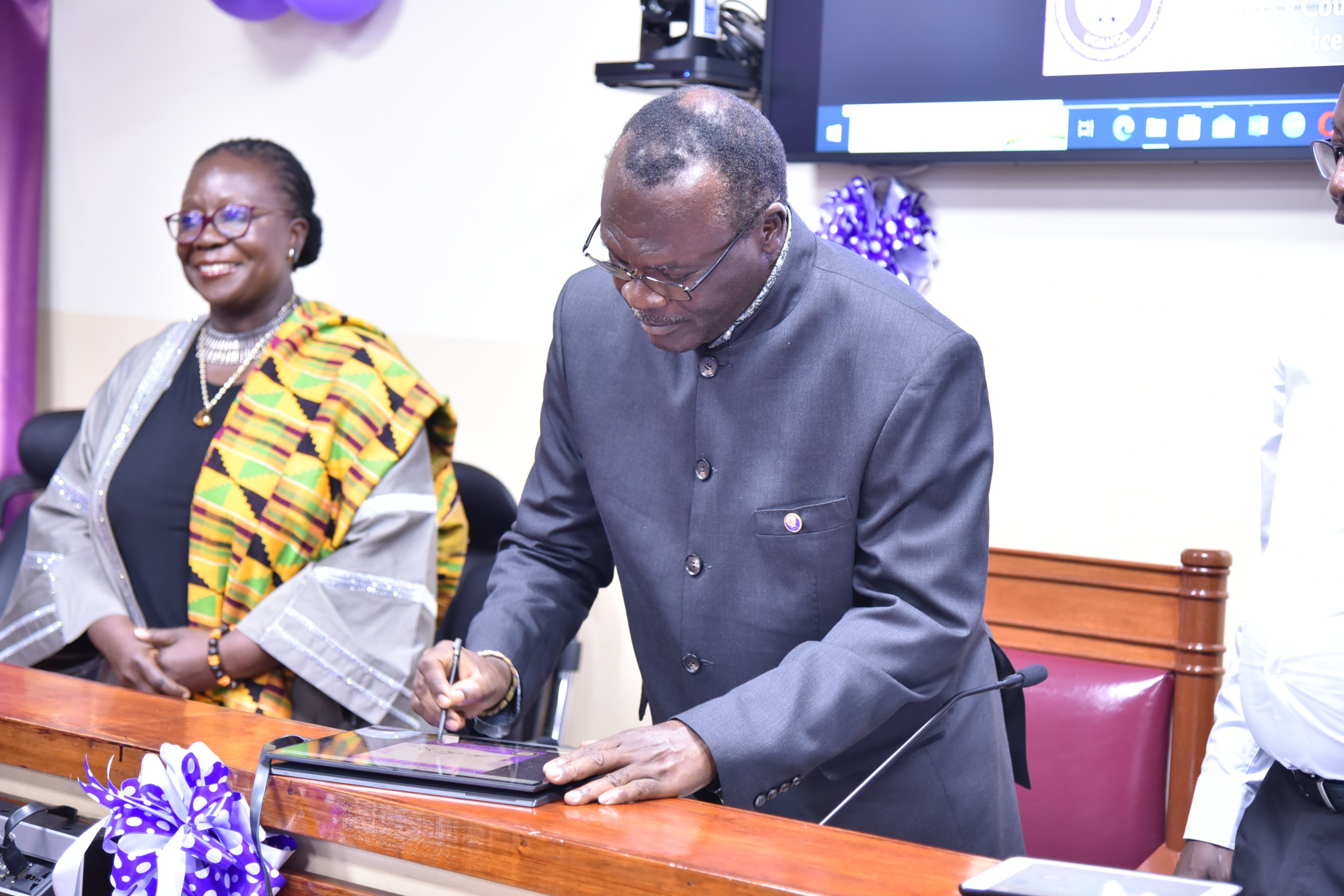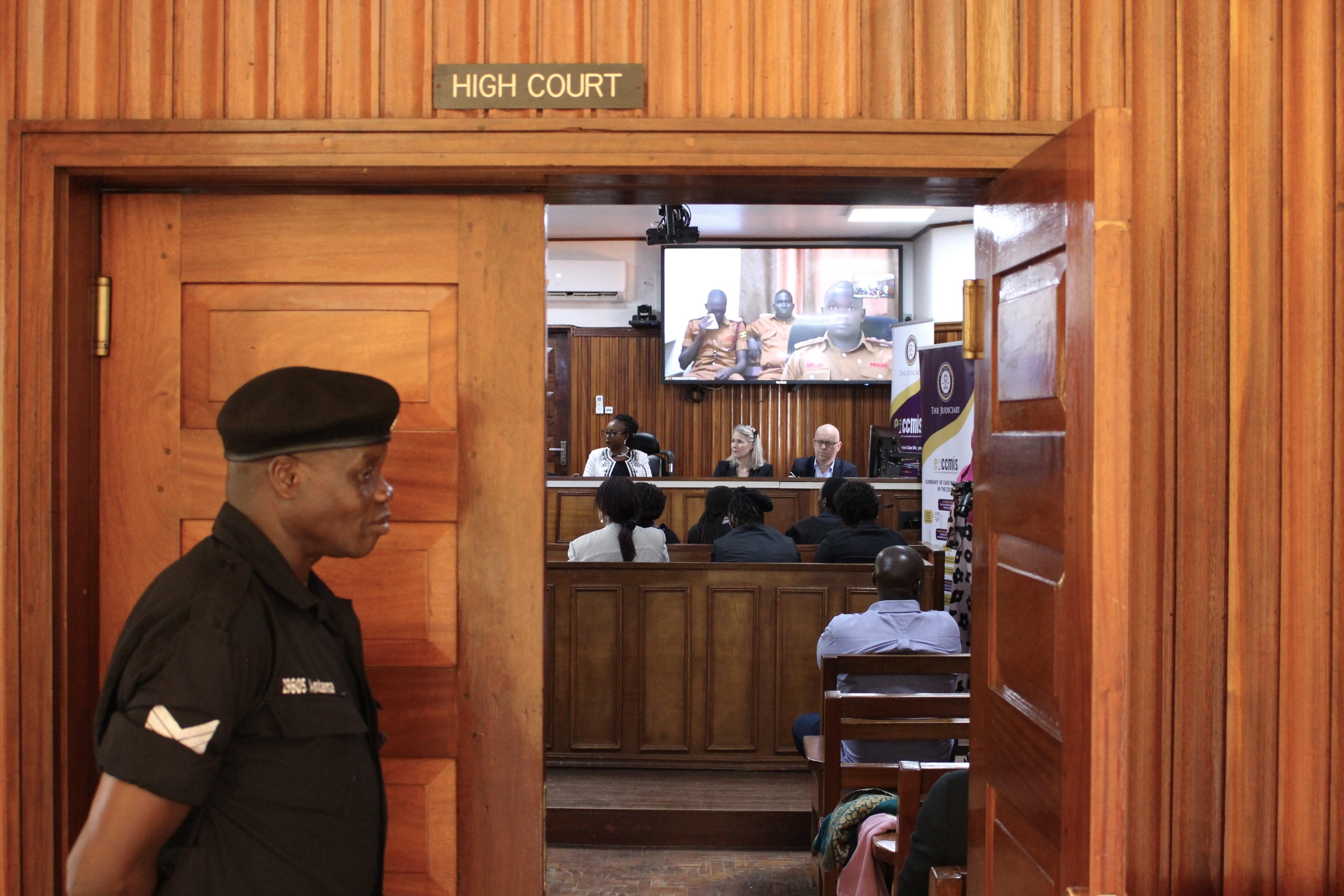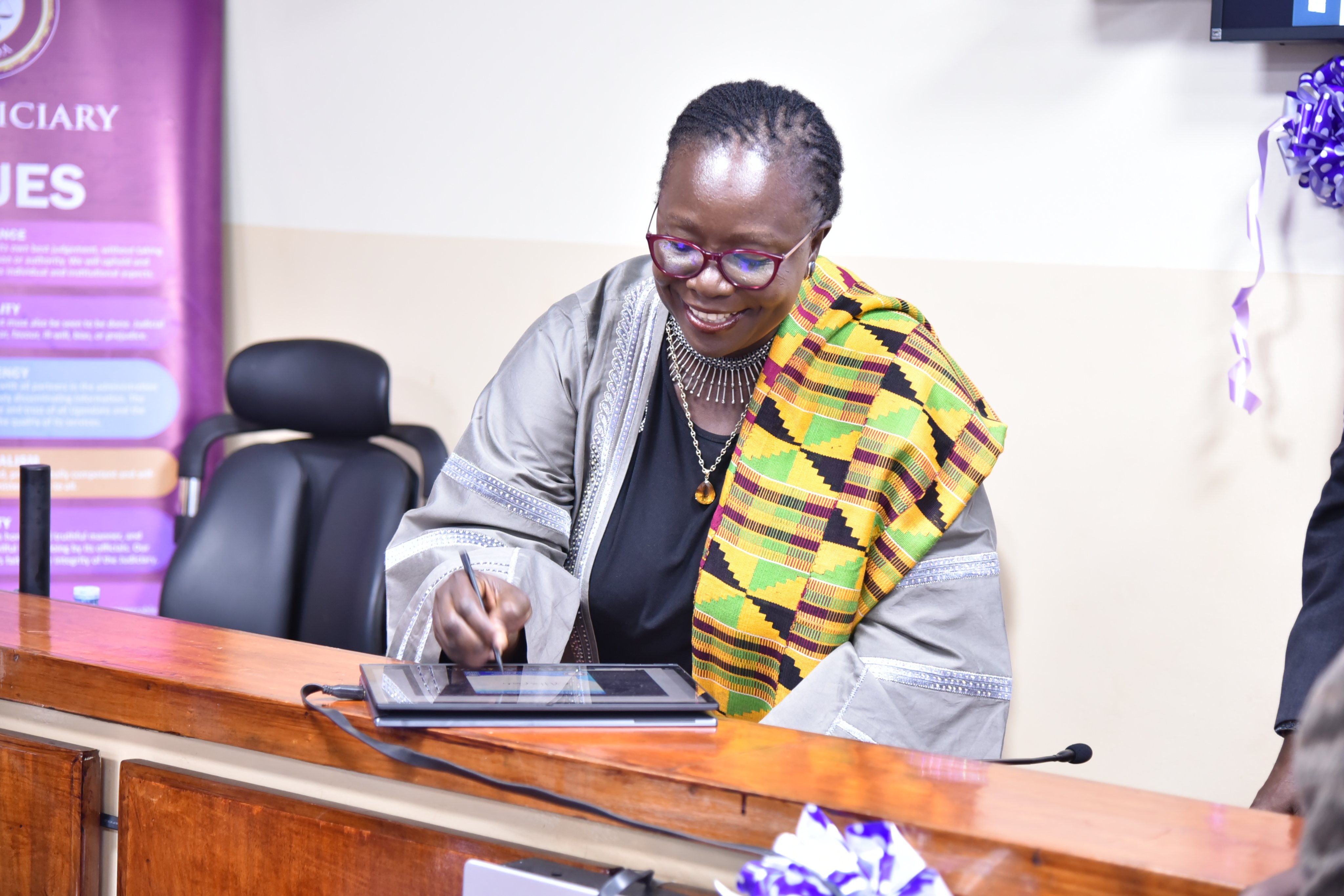His Lordship the Honorable Chief Justice of Uganda Owiny Dollo Launches video conferencing system in Gulu.
Judiciary video conferencing system supported by UNDP eases access to justice in Uganda.
August 28, 2023

Chief Justice of Uganda (middle) launches the Gulu high Court video Conferencing System
“Previously, it was hard to believe that virtual court sessions are a reality, but after attending a virtual court session, I realized it is better than the physical ones…. The video conferencing facility is quicker and easier to use. I could hear what the judges were saying clearly, I could hear what the lawyers were saying clearly, and they also could hear me very well. I want to thank UNDP and the Judiciary of Uganda for setting up this facility. Now more than ever, I feel safer, health-wise due to the current COVID-19 and freer to express myself to the judges without any intimidations whatsoever,” an anonymous male prisoner at Masaka Main Prison said.
His story exemplifies the benefits of the video conferencing system in the Judiciary supported by the United Nations Development Programme (UNDP) The future of development is digital. At UNDP, we define digital as an ever-evolving range of technologies (like mobile technologies, artificial intelligence, machine learning, block chain, internet of things, and robotics to name a few). That impacts nearly all aspects of our world. Truly, it is mindset which translates into new ways of working that enables people and institutions to innovate with technology. In this digital era, the integration of digital technologies into the judicial and governance systems is inevitable. It is gratifying that the Judiciary of Uganda is already transforming its practices through embracing digitalization.
"On behalf of the Judiciary and the Government of Uganda, I would like to extend a vote of thanks to UNDP and all its supporting partners for your support," said Hon. Justice Alfonse C. Owiny-Dollo, Chief Justice of Uganda. "This will work toward the promotion of an efficient and effective administration of justice system in Uganda especially through automation of court processes. These tools and facilities have greatly facilitated the promotion and observance of human rights."
In the second national lockdown instituted to suppress further transmission of the novel coronavirus disease (COVID-19) in Uganda, case backlog remained a bottleneck to the right to a speedy trial, a key facet of the right to a fair hearing and is the principle upon which the saying “justice delayed is justice denied” was coined. In fact, the Uganda Code of Judicial Conduct principle 6.2 requires judicial officers to dispose of cases expeditiously and deliver judgment within 60 days. However, this is not always the case. In 2019, the Justice, Law and Order Sector reported that the case disposal rate in the justice sector was at 45% - meaning that many cases remain pending in the Judiciary over long periods of time.
Testimonies from court officials
The anonymous prisoner is not alone. Judicial officers also appreciate the contribution of the video conferencing facility to the administration of justice and want the system extended to other courts.
According to Hon. Lady Justice Katamba Victoria Nakintu Nkwanga, the Resident Judge, Masaka High Court, the system has improved security and made witnesses freer to give evidence.
“I am happy that there is security for both inmates and witnesses. Because of the facility, the court case witnesses are freer to give evidence especially children since they are separated in different places and locations. Previously, children would give their evidence in chambers, where there could be danger of feeling threatened while giving evidence especially with cases involving relatives since the chamber rooms are small,” Lady Justice Katamba Victoria Nakintu Nkwanga said.
Justice Nakintu also highlighted the need to extend the system to Kalangala Chief Magistrate’s Court whose location requires movement of inmates from the different islands to the court in Kalangala and back, which is very cost-ineffective and time-consuming.
Increased case hearings
The Video-conferencing facility can enhance access to justice for those with disabilities and limited financial resources, while reducing no-shows of defendants; reduce time and cost by speeding up hearings, reducing waiting times, and remove the need for security and other staff. It can improve data management as digital recording of audio, video and transcripts from hearings is simplified and more easily stored and shared. Other benefits include increased security to accused and witnesses; empowering witnesses to testify wherever they are, which also saves travel time, cost, and CO2 emissions. Through video conferencing, we can also enhance the interaction between higher and lower courts especially in sharing work experience, resources, and research; and discussing complex cases.
Case backlog has undermined the reputation of the Judiciary, with the public becoming, skeptical about the ability of the Judiciary to serve it. The delays in clearing cases and dispensing justice promptly have led to a rise in mob justice, substantial overcrowding of prisons and inordinate periods of pretrial detention.
At the core of the 2030 Agenda for Sustainable Development is a clear understanding that human rights, peace, security, and development are interlinked and mutually reinforcing. Through its entirety, the importance of enhancing access to justice, ensuring safety and security, and promoting human rights for sustainable development are reflected. The support toward the video conferencing system fills a gap by fostering timely case hearings and thereby accountability, which is in line with the sixteenth Sustainable Development Goal (SDG 16) under the 2030 Agenda.
How the video conferencing system works

Gulu high court in possession with the video conferencing System in Use
The system allows for witness testimony and hearings to be carried out at a distance, without having to transfer detainees physically to the courtroom. It also enables any person who has an interest in court proceedings to be involved in a hearing from a remote location. In its simplest form, a witness at a remote location may give his/her evidence via a video link to the court with audio-visual aides in the courtroom and in the remote location.
While is important to acknowledge that the digital technology can accelerate progress towards Uganda’s development agenda, it can also widen gaps for those who lack the skills or internet connectivity. Given that digital technologies are not inherently inclusive, it would require us to thoughtfully design and apply them in a way that leaves no one behind.
UNDP Initiatives in Partnership with the Judiciary of Uganda
UNDP is closely working with the judiciary on several initiatives which include;
Video-conferencing facilities in Masaka, Mbale, Mubende and Jinja in addition to the one we are launching in Gulu.
Toll-free line (Judiciary).
Supporting the Open Court days (Eastern, Western and Northern).
Knowledge and capacity building initiatives for example training of judicial officers and supporting South to south exchange programmes including recent exchange programmes between Ghana and Uganda).
Transcribing equipment etc.
In addition to the Judiciary, we are supporting other initiatives that will support the digitalization agenda. The most recent is the Digital Transformation Roadmap launched by HE the Vice president as well as a Big Data Utilization Strategy, a Digital Acceleration Programme for schools, setting up innovation hubs in universities such as Makerere, Kabale and we will be initiating discussions with Gulu University on similar partnerships. We are re-purposing several ICT Hubs that can support the digital ecosystem in Kasanga, Nakawa, Ssezibwa. We are also digitalizing several government institutions.
About the visit to Gulu High Court

Ms. Elsie Attafuah during the launch of the video conferencing system in Gulu High Court
"Our visit to Gulu High Court has illustrated the strength of the partnership between UNDP and the Judiciary of Uganda," said UNDP Resident Representative Ms. Elsie Attafuah. "It has illustrated the impact that people-centered and innovative justice delivery services can have not only in advancing access to justice but also advancing Uganda's national development aspirations."
Partners
UNDP has partnered with Norway, Sweden, Austria, Denmark, and Iceland for their generous financial support through the Strengthening Electoral Processes in Uganda (SEPU) project that has enabled UNDP to contribute towards enhancing the work of institutions of democracy. Let me also appreciate the United Nations family for our collective work under pillar one of the United Nations Sustainable Development Co-operation Framework.

 Locations
Locations